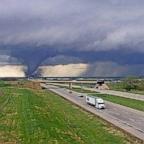Adm. Keating: 'We're Anxious to Help'
Top military diplomat speaks out on the challenge of getting aid to Myanmar.
May 15, 2008— -- The situation in the hardest-hit areas of cyclone-ravaged Myanmar, also known as Burma, is deteriorating rapidly -- even with lifesaving help just a few miles away.
Despite the growing crisis and urgent pleas from world leaders, Myanmar's rulers refuse to allow much available aid and relief workers into the country.
For Adm. Timothy Keating, the commander of U.S. forces in the Pacific, getting help to victims of Cyclone Nargis has become a personal crusade. He traveled halfway around the world this week to accompany the first plane load of U.S. supplies.
On the ground, he met with the head of Myanmar's navy and made a plea: Let us help your people. The response, however, wasn't all he wanted to hear.
"You know, there was a general air of 'Things aren't all that bad' we got from him," Keating told ABC News in an interview.
The humanitarian situation in Myanmar is increasingly desperate. Aid groups estimate there are millions of victims. The official death toll is more than 34,000, and experts expect that number to rise severalfold.
Only 13 U.S. plane loads of aid have been allowed into the country, a fraction of what is needed. The first was allowed to land Monday, more than a week after the storm hit.
Meanwhile, four U.S. Navy ships are waiting 50 miles off the coast with urgently needed medical equipment, doctors, water purification systems, shelter and food. Most importantly, they have H-46 cargo helicopters that are ready to get the supplies to people in need.
"Everything we can get our hands on, we're moving now," Keating said. "We'd like to move more. We have more capacity to lift and haul than we're filling."
The admiral has described the current effort as "better than 10 percent" but "well under what we could do at full effort."
So why won't Myanmar's leaders let more experts and supplies in?
"They're concerned about their security," Keating said. "There is a sense in the Burmese junta leadership that once countries are in in military form, that those countries may not leave. I did my personal and professional best to assure them that we will leave no fingerprints."




